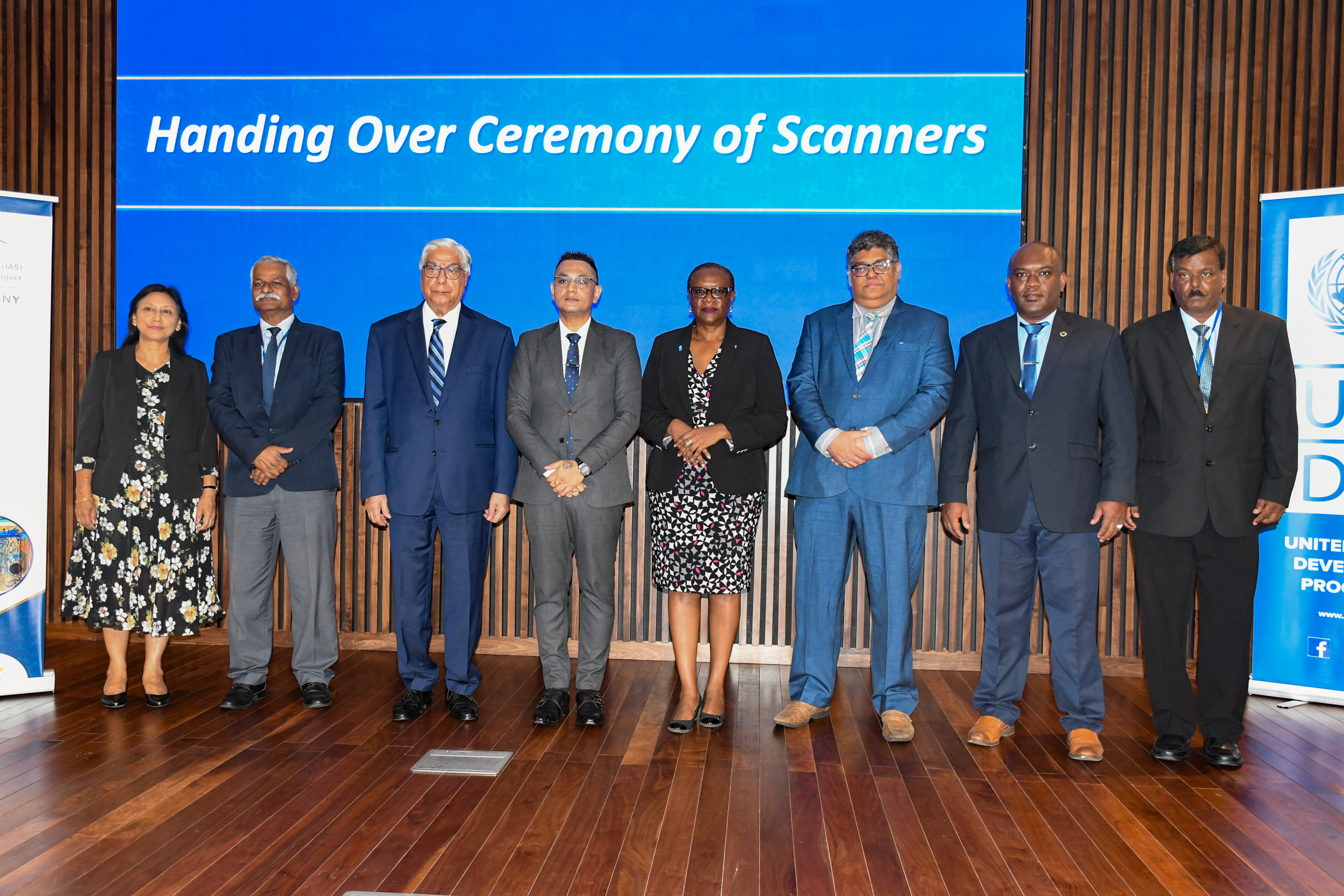This initiative carried out under the GEF-funded Mainstreaming Invasive Alien Species (IAS) Prevention, Control, and Management project, marks a significant milestone in addressing Invasive Alien Species in the Republic of Mauritius.
The United Nations Development Programme hands over organic scanners to strengthen the control and management of Invasive Alien Species (IAS) in the Republic of Mauritius.
November 30, 2023

Main stakeholders from UNDP, MRA, the Ministry of Agro-Industry and Food Security and National Parks and Conservation Service during the handing over ceremony
Three organic scanners, intended to enhance efforts in managing invasive alien species, were handed over by the United Nations Development Programme to the Mauritius Revenue Authority (MRA) on November 29, 2023. This initiative carried out under the GEF-funded Mainstreaming Invasive Alien Species (IAS) Prevention, Control, and Management project, marks a significant milestone in addressing Invasive Alien Species in the Republic of Mauritius.
Invasive Alien species (IAS) pose a great threat to biodiversity, causing disruptions in ecosystems and often resulting in irreparable ecological and economic consequences. In 2022, Invasive Alien Species (IAS) caused estimated losses of MUR 5 billion to the country, with management costs reaching MUR 2 billion (which amounts to around 1.2% of our national GDP). The traditional management of IAS has relied on chemical methodologies, posing potential risks to non-target species and the broader ecological equilibrium. The use of organic scanners now allows for a more sustainable approach through the early detection of potential threats. Alongside appropriate management methodologies and protocols, these technologies enable rapid identification and timely response to IAS, contributing to the prevention of their proliferation. The organic scanners will be employed to clear air cargo at Plaisance Air Transport Services (PATS) and postal cargo at the Parcel Post Office in Port-Louis.
Latest state-of-the-art technologies to ensure a more sustainable management of IAS
Honourable Teeruthraj Hurdoyal, Minister of Agro-Industry and Food Security, acknowledged UNDP’s contribution through the IAS project, which has secured funding of 4 million USD from the Global Environment Facility (GEF). Minister Hurdoyal stressed the importance for Mauritius to effectively implement Article 8(h) of the Convention of Biological Diversity along with other international instruments, such as the International Plant Protection Convention. He concluded by highlighting that “the introduction of organic scanners offers a promising avenue for the control and management of invasive species in a manner that aligns with our commitment to ecological balance and environmental stewardship.”
Addressing the audience, Ms. Amanda Serumaga, UNDP Mauritius and Seychelles Resident Representative, stated: “As we embrace the potential of organic scanners, it is crucial to recognize that their success depends on collaboration. Governments, researchers, conservationists, and local communities must work hand in hand to integrate these technologies into comprehensive invasive species management strategies. Public awareness and education are essential components of this collaborative effort, ensuring that the benefits of organic scanners are understood and embraced on a global scale.”
Mr. Sudhamo Lal, Director General of Mauritius Revenue Authority, reassured all the involved stakeholders that “the MRA would make optimum use of the equipment and rightly justify the investment made for its acquisition.” He also highlighted that: “X-ray scanners play a vital role in the protection of our borders by enabling the detection of contraband and illicit goods such as narcotics, weapons, counterfeit goods, and smuggled items.”
After the formal handover ceremony, delegates from relevant ministries, the UNDP, the Mauritius Revenue Authority (MRA), and the Customs Department conducted an on-site visit at Plaisance Air Transport Services Ltd, where one of the organic scanners is already operational.

 Locations
Locations








